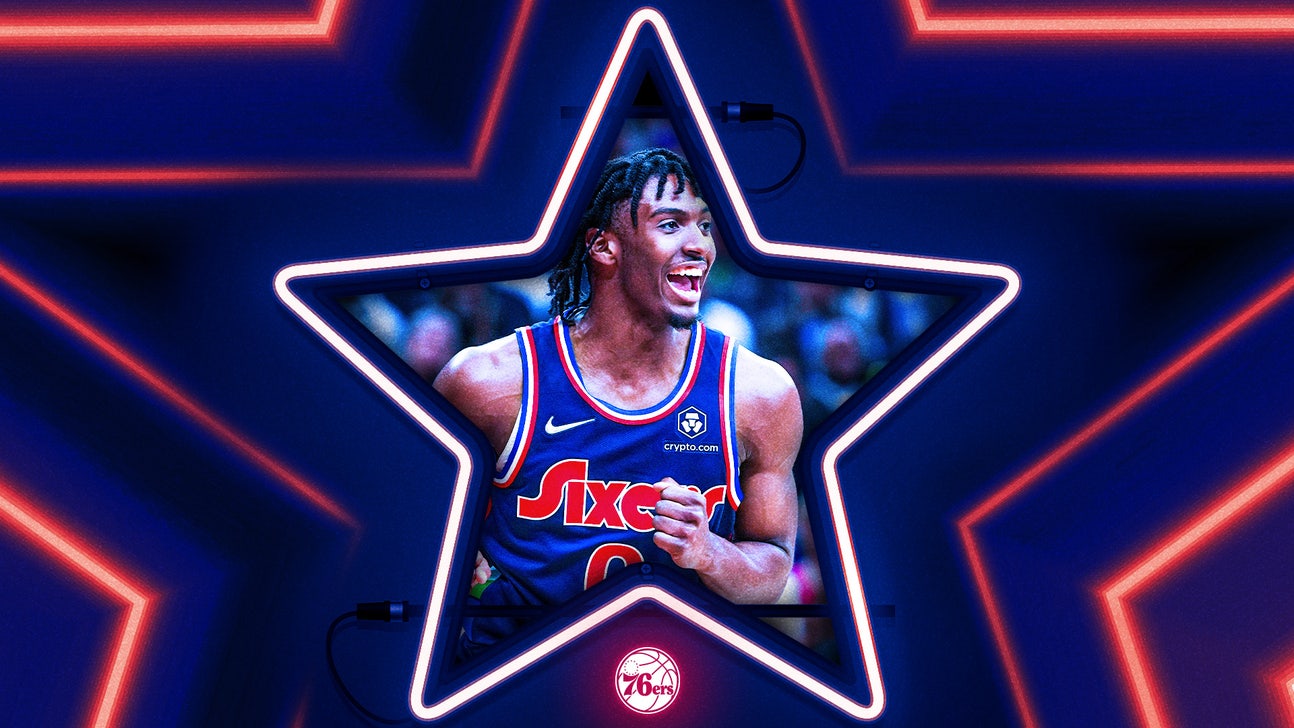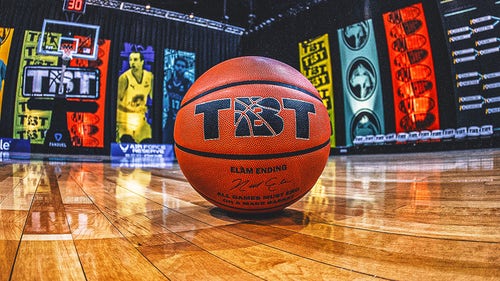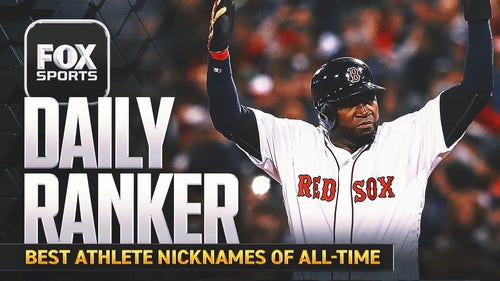
How Tyrese Maxey became key to Philadelphia 76ers' title hopes
By Yaron Weitzman
FOX Sports NBA Writer
Tyrese Maxey was dancing.
He’s often dancing, but this was different. It was Christmas Eve. Plates of gourmet wings covered the kitchen table of his South Jersey home. The family’s favorite Temptations hits filled the room.
That’s when one of his sisters interrupted the group.
"I smell smoke," she said.
It was coming from the laundry room, which was attached to the garage. Flames were rushing through the windows and into the house.
The family fled. Maxey stood outside in just one shoe. A neighbor brought blankets. Maxey lost all his belongings other than what he had scattered around his car. The next day, he threw all that, plus a bunch of Sixers gear, into a bag and boarded a plane with the Philadelphia 76ers for a five-day road trip.
He played fine the first game but struggled in the one after that. Later that night, he called his mom. He told her that in the middle of the second quarter, he experienced a moment in which it all hit him, and he realized how lucky he was to be alive.
"It’s like we always talk about it," he told her. "I know I can’t take any of this for granted."
*** *** ***
You can’t talk about Tyrese Maxey without talking about the smile. For one, it is the thing that jumps off the screen most while watching him play. But also, it’s the very first thing anyone who knows him mentions when asked about him.
"Every time he walks into the gym, it’s like sunshine," Sixers coach Doc Rivers told me before a recent practice.

Tyrese Maxey, left, always has a smile on his face. It was especially bright Saturday, when he scored a career-playoff-high 38 points against the Raptors in Game 1 of the Sixers' Eastern Conference first-round series. (Photo by Tim Nwachukwu/Getty Images)
A few minutes later, I told Sixers forward Tobias Harris that I was writing a story about Maxey.
"The dude’s always smiling," Harris said. "Just look at him now." Maxey was on the other side of the court, yapping away and shadow guarding assistant coach Sam Cassell, who himself was beaming.
Maxey’s smiles come in all sorts of shapes and styles. There’s the grin that seems to be his face’s natural resting position and the burst of delight he unleashes after exhilarating acts, be it a crafty finish, a smooth assist from a teammate or even a hug from an opponent. On these smiles, his mouth opens big and wide, and his front teeth jut out just a bit, and his entire body melts into an expression of joy.
That joy is contagious. It’s why Joel Embiid will giggle during a postgame news conference while telling Maxey he played like trash. It’s why fans, ever since a clip of Maxey humming the Sixers’ victory song went viral in Philadelphia, stop him multiple times a week on the street, requesting to hear him sing.
Maxey smiles when he’s happy and also when he’s annoyed. "But you have to know him well to spot those," his longtime friend, Chris Harris Jr., said. "It’s usually if someone says something to him." He smiles so much that he has been scolded for not taking the game seriously, like the time an elementary school coach pulled Maxey’s mom aside to complain about her son’s flippant approach.
"I said to her, ‘Mom, I am taking it seriously. I’m just happy,'" Maxey told me over a recent FaceTime call from the Sixers’ practice facility.
I asked him where that happiness comes from.
"I think from my grandmothers," he said. Both lived with Maxey’s family when he was growing up in the city of Garland, right outside Dallas, and taught him to go through life "being thankful for everything you have, even in adversity, and find joy in all moments. And it just became my personality," he said.
Life has given Tyrese Maxey all sorts of opportunities to grow overwhelmed. Just look at his past year. At the age of 21 and in his second NBA season, he was thrust into the starting point guard job for a contending team. A few months later, a fire burned down his home. A few months after that, he was forced to learn how to play with one of the game’s most ball-dominant stars. Yet through it all, the smile endures.
Part of it is that he has become a stud on the court: 17.5 points per game and 4.5 assists in the regular season and 38 points in the Sixers’ Game 1 playoff win over the Toronto Raptors. But it takes more than on-court prowess to thrive amid this sort of chaos. Maxey’s disposition and his willingness to be this malleable and the unmitigated joy he carries no matter which role he’s in — and no matter what life throws at him — make it all work.
"You don’t see a lot of young players who can have as much thrown at them as Tyrese has and adapt at an elite level," Sixers veteran Georges Niang said.
Which has made Maxey not only someone who is essential to everything the Sixers do but also a player whose breakout and trajectory could very well be the keys to a Sixers title run.
*** *** ***
Everyone who knows Tyrese Maxey has a story that falls under the umbrella of, "Can you believe this kid?" For example: There was the time in high school when he walked over to his coach after hearing him lash out at a referee, draped his arm around his shoulders and said, "Don’t worry, we got this."
But my favorite, I think, is how when Maxey started showing up to the Sixers’ practice facility in the fall of 2020, the team’s coaching staff was suspicious of his behavior. Not because he was doing anything wrong but rather because they assumed anyone acting that way — the enthusiasm he showed for showing up to work and then putting the work in — had to be putting on a show. At one point, a member of the coaching staff called up Kenny Payne, who was an assistant at Kentucky during Maxey’s one year there.
"I gotta know," the coach asked Payne, "is this all an act, or this kid for real?"
Payne passed along what he knew of Maxey — that he was a kid who enjoyed being in the gym more than anyone he’d ever coached — but the staff remained dubious. They’d seen a lot of rookies who showed up early and stayed late and said all the right things early in their careers, only to, little by little, have those habits fade. Maxey, they figured, would do the same.
The habits never changed, forcing the Sixers to institute limits of their own. Maxey’s uncle, Brandon McKay, told me a story about picking Maxey up at the airport last season following a game at Utah.
"And when the team got off the plane," he recalled, "one of the coaches comes up to me and goes, ‘Unc, whatever you do, do not let Tyrese go to the gym.'" McKay was confused. It was 3:30 in the morning. The Sixers were coming off a four-game road trip. Who said anything about working out?
Maxey settled into the passenger seat.
"I gotta go to the gym," he told McKay.
McKay looked at him. "They told me not to take you," he replied.
"I don’t care," Maxey said. "We’re going."
I relayed this story to Rivers. He laughed. "Yeah, he’s the hardest worker in our gym," Rivers said. "We had to put blackout days in for him."
I asked Rivers how many players throughout his coaching career have forced him to take that measure.
"Very few," he said.
*** *** ***
That’s not to say that Maxey’s rise has been without bumps. But learning how to deal with those bumps is what has prepared him for this season.
At Kentucky, Maxey struggled on the court for the first time in his life. The plan was for his father, Tyrone, to move to Lexington with him, but that was derailed when Tyrone suffered a stroke a few months before the season (he has since fully recovered). Then, upon arriving on campus, Maxey’s jumper deserted him. He also had trouble adjusting to playing alongside other top-shelf ball-handlers.
As always, he continued to smile, but this only further irked Kentucky coach John Calipari, who’d never seen someone laugh during conditioning drills. And anyway, how could Maxey be so happy when he wasn’t playing well?
"Calipari pushed him as hard as anybody in our time," said Joel Justus, a former Kentucky assistant coach. "It’s because he thought he was really good, and it’s how he prepares people for being professionals. But Kentucky is a spot that causes a lot of kids to grit their teeth."
And yet, Justus said, Maxey never changed his disposition. "He never allowed the pressure of how he was coached to dictate his joy."
Maxey found his footing by the end of the season, earning All-SEC Second-Team honors. The Sixers, who had him ranked as a late lottery pick, pounced during the 2020 draft, when he fell to them at No. 21.
The good news was Maxey was joining a team contending for a title. The bad news was that meant typical rookie mistakes would not be tolerated. His transition was made even more difficult by the cancellation of summer league due to the pandemic. Maxey then missed most of training camp after testing positive for COVID-19.
"It was a really difficult year," Maxey told me. "I got thrown right into the fire and was expected to contribute on a No. 1 team in the East."
Maxey showed flashes, but his poor defense and iffy shot selection — specifically his love of floaters — frustrated the coaching staff. They worried he was more of an off-guard, as opposed to a point guard. They toyed with sending him down to the G League. Rivers was hard on him. So was Cassell. They believed in him — Cassell would say, "Don’t worry about when we yell at you. Be worried when we start taking you out of games" — but as the playoffs approached last season, they were growing concerned.
Maxey told me that the turning point for him came following a late-season win over the Houston Rockets. He played well in the victory, racking up 12 points and seven assists in 22 minutes, but he also launched a pull-up transition 3 in the fourth quarter that infuriated Rivers, who scolded Maxey during the next timeout.
"I was like, ‘Coach, we’re up 30,’" Maxey recalled.
The next day, Rivers asked Maxey to meet him in his office. The coach wasn’t angry. He just wanted to clarify for Maxey what he expected of him, that his job was not to score but rather to fill in wherever the team needed him and make winning plays.
"Some guys," Rivers told him, "go their entire careers without playing for a contender."
He didn’t want Maxey to take that opportunity for granted.
"I really took that all to heart," Maxey told me.
Rivers noticed a difference. He began trusting Maxey more, even playing him 29 minutes in a win-or-go-home Game 6 in the second round. The Sixers lost the series, but Maxey had shown Rivers enough. That summer, when Ben Simmons began his holdout, Rivers told Maxey he’d be playing major minutes in the upcoming season, whether Simmons returned or not.
Maxey spent the offseason preparing for his new role. He honed his jumper so that he could play alongside Embiid, but he also worked on his reads out of the pick-and-roll so that he could lead the attack. His teammates loved him, especially Embiid, who last year bought Maxey a PS5. But they were also unsure whether Maxey was ready for that role.
"He's been taught how to score the ball, and he's a really good scorer, but he has to be a point guard," Embiid told reporters during training camp. "He has to get guys in their spots. He has to call plays … he needs to be able to get to the paint, finish and find other guys."
Maxey has done all that — and more. "He doesn’t even realize how good he is yet," Sixers president of basketball operations Daryl Morey told me. Maxey is a blur with the ball but has also transformed himself from a subpar 3-point shooter (30.1% last season) into, statistically, one of the league’s best (42.7%, third in the NBA). He spent the majority of the season serving as the second-best player on one of the league’s top teams.
Whatever concerns his teammates once had no longer exist.
Last week, in the lead-up to the Sixers’ first-round matchup with the Raptors, Embiid was asked about Maxey’s growth throughout the season.
"If it was up to me," Embiid told reporters, "he’d probably be the Most Improved Player in the league."
*** *** ***
Tip-off was nearly two hours away, and as usual, Maxey was out on the floor early, working with Cassell and Spencer Rivers, a player development coach for the Sixers and Doc’s son. The Sixers were in Toronto for what would turn out to be a late-season preview of their first-round playoff series.
Watching Maxey work out is like being given a window into the rare role he has been thrust into as a second-year player. He began the season as the Sixers’ primary perimeter threat and No. 2 option, meaning he had to learn to both play alongside Embiid and run the show by himself. Then in mid-February, James Harden arrived. That meant more time off the ball, spotting up and watching Harden dance alone at the top of the key. Most players come playoff time have defined roles. Maxey’s is that his role can change at any minute.
And so, he started up near half court, with Rivers guarding him and Cassell offering directions and tips, working on pick-and-roll reads. Then it was time to shift to the wing, where Maxey alternated between catch-and-shoot and catch-and-drives, something he has been paying particular attention to when watching film. At one point, Cassell, standing at the top of the key, stationed Maxey in the corner and told Rivers to creep up to within a foot of his chest.
"Block the shot," he told him.
Cassell fired a pass at Maxey, who tried flicking the ball up to the rim, only for Rivers to swat it out of bounds. Maxey never had a chance. He looked back at Cassell and burst into laughter.
"Let me do another one," he said.
Yaron Weitzman is an NBA writer for FOX Sports and the author of "Tanking to the Top: The Philadelphia 76ers and the Most Audacious Process in the History of Professional Sports." Follow him on Twitter at @YaronWeitzman.









